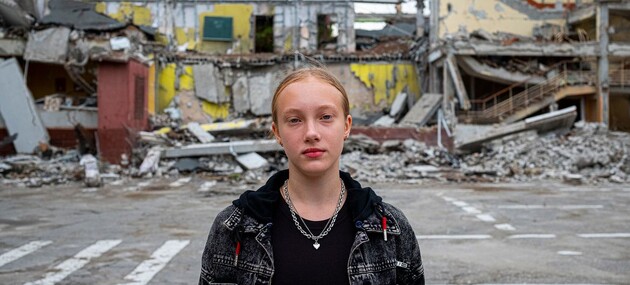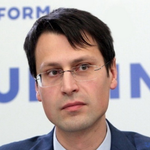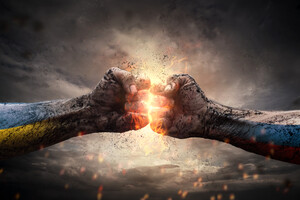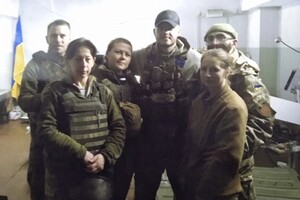War through the eyes of civilians: how human destinies are intertwined in national memory

The Russian invasion on February 24, 2022 divided the lives of millions of Ukrainians into "before" and "after" stages. Paying tribute to those who died in the Second World War, we are currently fighting and suffering the terrible consequences of the war that is currently taking place in our country. Collecting, preserving and understanding this experience is important in order to honor the dead and warn the living.
In this text, we will talk about the first observations and preliminary conclusions that the "Democratic Initiatives" Foundation managed to obtain thanks to a nationwide survey that was conducted in March 2023 and 12 focus group discussions throughout Ukraine. In addition, these first observations and preliminary conclusions were also made with the support of the Ukrainian charity exchange called Dobro.ua.
The study showed two interesting and important trends in the formation of the latest national memory.
The war, which became a battle for national survival, contributed to the formation of considerable public trust in the leadership of the state and the Armed Forces of Ukraine. It is Volodymyr Zelenskyy and Valerii Zaluzhnyi that people give the right to mark events as successful and tragic, to decide whether a certain person is a hero or a scoundrel. This right is recognized by the majority of citizens who trust them and highly appreciate their contribution to the fight against enemies. Although this is not part of the direct duties of the president and the commander-in-chief of the Armed Forces of Ukraine, their words will form the so-called official version of the course of the war.
At the same time, many hundreds of thousands, millions of people – for now we are talking about civilians – became eyewitnesses and direct participants in the events of the war. Their experience already forms the basis of the people's annals of resistance against Russian aggression.
Both views of the war intersect and intertwine in the media, which 24/7 both quotes national leaders and tells the life stories of citizens. The high level of trust in the commanders-in-chief after 15 months of testing shows that the "high" and "low" visions of the course of events in the war complement each other in many ways. It is very important that there are no gaps in the people's memory regarding the state of development of the situation, whether it concerns successes or failures.
There is another important factor, namely the vision of the development of events from the side of the soldiers, based on the memories and testimonies of veterans and volunteers who work at the front. This is an extremely important part of the national memory, which began to take shape in 2014. Although in this text we bypass it exclusively for methodological reasons, because the study of this segment requires separate attention. Now we can only emphasize that from 2014 to 2021, it performed an important function of maintaining attention and raising awareness of the threat from Russia. It is worth noting that it was this vision and understanding of the soldiers about the likely development of events that prepared the basis for a mass organized voluntary movement in the first months of the war.
We offer to look at how different memories and impressions of very different people from all corners of Ukraine create a memory of the war from the first days of the full-scale invasion and what tasks are now facing society and the authorities.
Confusion and fear
Man, city of Chernihiv: "The offensive is going on, all military units, military facilities are being shelled... Well, of course, some kind of... Not to say panic... I don't know, maybe uncertainty and cognitive dissonance to some extent. So yes: where to start and where to go? No one prepared us for this, no one told us what to do or how to react. Perhaps the local authorities were also not ready for such a development of events, namely the beginning of active hostilities. Let's say that people were left with the question of where to run and what to do? What essentials should you take with you, where should you hide in such a situation? How to react in general and what priority decisions need to be made?"
First of all, we note that 45.7% of respondents admitted that the beginning of the war caught them by surprise, they did not believe and did not expect it. Another 29.4% of the population were afraid of war, but hoped for the best until the end. And 12.2% of the surveyed people were inclined to the opinion that the war would start, but did not know what to do about it. It is worth noting that only 9.8% of people were prepared for the worst in one way or another.
These are very important markers that indicate several things. Firstly, it completely refutes the Russian propaganda that allegedly "Ukraine was preparing to attack" and NATO (the North Atlantic Treaty Organization) was "fueling the aggression." This is another argument and proof that Russia committed a crime of aggression against our country, because no one threatened its security and integrity.
Secondly, it shows how effective hybrid tools of disinformation and masking aggression can be. After all, an important factor in the success of modern operations of effective military actions is misleading the opponent about the intentions, nature and timing of the attack. All those who deliberately denied and spread disinformation beneficial to the enemy should be punished.
Thirdly, it raises the question of the responsibility of state institutions, which were supposed to prepare society for struggle, to teach people not just to survive, but also to evacuate in an organized manner and to resist effectively. It is not only about preparing and informing people in the last months before the invasion, but also about the years when it was necessary to build the basis for national resistance, which was done mainly by the forces of the veteran and volunteer movement after 2014.
This is an extremely important part of the national memory, which cannot be erased or belittled in order to prevent a new tragedy in the future. In addition, it is also an important lesson for our Western allies. If officials rely on Article 5 of the Washington Treaty in matters of country leadership and strategic decision-making, but the majority of citizens living in the country do not believe in the threat, in this case, the collective security system may not work at a time of crisis.
Pain and regret
Woman, city of Kharkiv: "The next day, when I went out, I saw, as if a giant had eaten a piece of the house. Everything looked as if the giant just came and bit off a piece of the house like a cookie."
Man, city of Kyiv: "About the thing that brought me the most sadness at that time, it was when some city falls under occupation. The consequences of this occupation for the civilian population are what upsets the most. Why exactly the factor of the occupation of the city brings me the most sadness, because our cities suffer both from shelling and from damage."
We asked several open-ended questions to find out what the spontaneous reaction of citizens would be. And it is their vivid and emotional reaction that will witness the most memorable events during active military operations, associated with pain and despair, pride and victory, hope and optimism. The survey confirmed that the war remains in the people's memory primarily as a memory of the loss of life (23.8%), the destruction caused by shelling and missile attacks (21.9%), the atrocities of Russian troops in Bucha, Irpen, Mariupol, Izyum and other cities (16%). The crimes committed by the Russian army in Bucha, the destruction of the drama theater in Mariupol and the execution of prisoners from the " Azovstal " (Metallurgical Combine) garrison in Olenivka were especially remembered among the people. In addition, the people of Ukraine also remember the crimes committed by the Russians in the city of Izyum, rocket attacks on residential high-rise buildings in the cities of Odesa, Dnipro, Zaporizhzhia, Kryvyi Rih, Kramatorsk, and the mass abduction of children from the occupied Ukrainian territories.
Our pain and sorrow do not need to be translated into other languages. This dimension of the war, along with the strength and courage of our military, certainly played a key role in creating the most important international coalition, namely the moral pressure of millions of Europeans and Americans on their governments with the demand to stand on the side of good, to prevent evil from reigning, to prevent the victory of genocide.
And this poses a big question to the so-called good and not-so-good Russians and our Western allies. Can "another Russia" be formed after the war, if the Russians do not recognize their collective responsibility for the crimes committed? After all, even in Europe, where they are not watched by Putin's security guards, Russians voluntarily go out with slogans and flags, under which their compatriots from February 2022 destroy the neighboring country and "brotherly people". Without this, it is useless to wait for permanent peace and to conduct negotiations in any format with the regime of war criminals.
Rage, determination and cohesion
Woman, city of Kharkiv: "February 25, the intersection that is now called Heroes of Kharkiv. A woman is coming from the church. I think so, most likely it comes from the Cathedral of the Intercession of the Most Holy Theotokos on the Moat, or Pokrovskyi Cathedral. She speaks loudly on the phone, stops and tells someone into the receiver: "Oh, we were just told there in the church, when we were just going there to pray now, there Father was making a procession around the church. But we were told to wait three days and everything would be fine. They will fire only at certain objects, and then they will come here and restore order. And everyone is already fed up with these people who are supporters of Bandera's ideas...", she said something along these lines... At first, the first thought was that maybe this woman is just some kind of provocateur and deliberately goes around talking loudly on the phone and saying such things... How can you wait for the arrival of the Russian army, the creation of the Russian "world" and its seizure of Ukrainian territories and at the same time go to church to pray to God? They throw bombs at you. But you were waiting for someone here with impatience…”
Man, city of Zaporizhzhia: "I was very surprised that despite the catastrophic situation, we coped very well with the difficulties and the civil society was also quite active in helping and supporting by all available means during the war. That is, for a long time, Zaporizhzhia was a city in which there were many supporters of Russia, but at this critical moment, February 24, and in the first two weeks of the war, all volunteer points, all military commissars, they were simply overflowing with volunteers who wanted to help."
Yes, it is true, we as a society survived, because thanks to our Armed Forces of Ukraine, we managed to win important small and large victories from the first days of the war. This is what (78%) of the respondents think. Thanks to the soldiers, people believed in themselves as a united nation (62%). And the example of the work of volunteers (46%), as well as partisans (18%), showed how important the daily contribution of everyone is to the future victory.
"The Russians, like any enemy, must be destroyed. Such people as our enemies should only be destroyed," the words of Valerii Zaluzhnyi in an interview with The Economist clearly reflected the credo of the Ukrainian war for independence. Success on the battlefield convinces ordinary citizens of the ability to win a battle against a formidable and dangerous enemy and not give up. Such things as the memory of the sinking of the ship named "Moscow", the liberation of Kyiv region, Chernihiv region, Sumy region and Kharkiv region, the importance of the resistance movement in the temporarily occupied Kherson strengthens the belief in the final victory. And the memories of the defense of Mariupol and the heavy battles near the city of Bakhmut create the basis for general and long-lasting respect for the fallen, wounded, prisoners and their relatives.
"I need weapons, not evacuation," these words of Volodymyr Zelenskyy formed an imperative in relations with allies. Now Ukrainians know how to distinguish a friend from an enemy, an ally from an indifferent bystander. The memory of great support and assistance will be the key to measured, judicious diplomacy, aimed at expanding the circle of friends and constantly strengthening ties and trust with allies.
A few conclusions
Firstly, the majority of Ukrainians fully felt their subjectivity, realized themselves as citizens responsible for defeat or victory in the war, for their survival and the future of other generations. This is not just the short-term effect of "uniting around the flag" inherent in any community in times of danger. This is the understanding that the Ukrainian state belongs to the Ukrainian people, its destiny and freedom are inextricably linked with independence. The authorities gave priority to volunteer soldiers and volunteers.
Secondly, Russia's war crimes were most likely deliberately planned and directed to break resistance and force Ukrainians to surrender or leave the country altogether, under the threat of death and suffering. However, now the memory of executions, torture, looting and collaborationism is becoming a powerful source of public reproach and the reason for the desire for justice and punishment of the perpetrators of the war. It is this memory that is the basis for the formation and justification by Ukraine of such conditions for the end of the war, which will never again allow Russia to repeat these fears.
Thirdly, President Volodymyr Zelenskyy and his spokesmen bear great responsibility for shaping the official narrative of national war memory. It is extremely important to combine a critical attitude to one's own words and respect for the people's everyday memory of the war, for local successes and tragedies, which gradually make up the mosaic of the struggle for independence.
Read this article in russian and Ukrainian.
Please select it with the mouse and press Ctrl+Enter or Submit a bug












.png)


-1.png)
.png)

 Login with Google
Login with Google